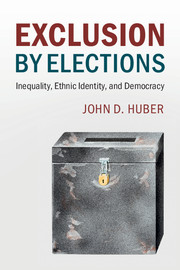Book contents
- Frontmatter
- Contents
- List of Figures
- List of Tables
- Acknowledgments
- 1 Introduction
- 2 Why Worry about Inequality and Ethnic Politics?
- PART I THE THEORETICAL ARGUMENT
- PART II EMPIRICAL EVIDENCE FOR THE ARGUMENT
- 6 Theory and Causal Identification
- 7 Income and Voting Behavior
- 8 Inequality, Ethnic Diversity, and the Ethnification of Party Systems
- 9 Social Structure, Redistribution, and Democratic Transitions
- 10 Conclusion: Inequality and the Politics of Exclusion
- References
- Index
- Miscellaneous Endmatter
8 - Inequality, Ethnic Diversity, and the Ethnification of Party Systems
from PART II - EMPIRICAL EVIDENCE FOR THE ARGUMENT
Published online by Cambridge University Press: 18 May 2017
- Frontmatter
- Contents
- List of Figures
- List of Tables
- Acknowledgments
- 1 Introduction
- 2 Why Worry about Inequality and Ethnic Politics?
- PART I THE THEORETICAL ARGUMENT
- PART II EMPIRICAL EVIDENCE FOR THE ARGUMENT
- 6 Theory and Causal Identification
- 7 Income and Voting Behavior
- 8 Inequality, Ethnic Diversity, and the Ethnification of Party Systems
- 9 Social Structure, Redistribution, and Democratic Transitions
- 10 Conclusion: Inequality and the Politics of Exclusion
- References
- Index
- Miscellaneous Endmatter
Summary
Chapter 7 presented evidence that when the conditions for class politics in the theoretical model are weak, so is the relationship between income and voting behavior. The theoretical argument also suggests, however, that when the conditions for class politics are weaker, the conditions for ethnic politics should be stronger. This chapter takes up this second implication of the argument. When the conditions for class politics are weak – and thus the conditions for ethnic politics are strong – is there evidence of a stronger role of ethnicity in voting? To address this question, I examine how the ethnic bases of support for political parties vary with the conditions for class and ethnic politics.
MEASURING ETHNIC VOTING BEHAVIOR
We can think of the ethnic basis of support for a given party as a function of the degree to which the ethnic composition of the party's supporters differs from the ethnic composition of support for other parties. Suppose there are two parties and two groups. If 70 percent of Party A's support comes from the Green group and 30 percent comes from the Blue group, is this party “ethnified”? We cannot answer this without knowing the support for Party B. If 70 percent of Party B's support also comes from the Green group and 30 percent comes from the Blue group, then both parties simply reflect the distribution of groups in society, and it would be odd to say either is particularly ethnified. But if 30 percent of Party B's support comes from the Green group and 70 percent comes from the Blue group, then both parties are relatively ethnified, and they would be even more ethnified if they each received 90 percent from their primary support group and 10 percent from the other group.
To test the theoretical argument about inequality, we need to use a measure of party-system ethnification that captures this basic idea of what it means for any given party to be “ethnified.” The goal of the test is to determine if such a measure is related to the interaction of income inequality and ethnic polarization.
- Type
- Chapter
- Information
- Exclusion by ElectionsInequality, Ethnic Identity, and Democracy, pp. 144 - 159Publisher: Cambridge University PressPrint publication year: 2017



